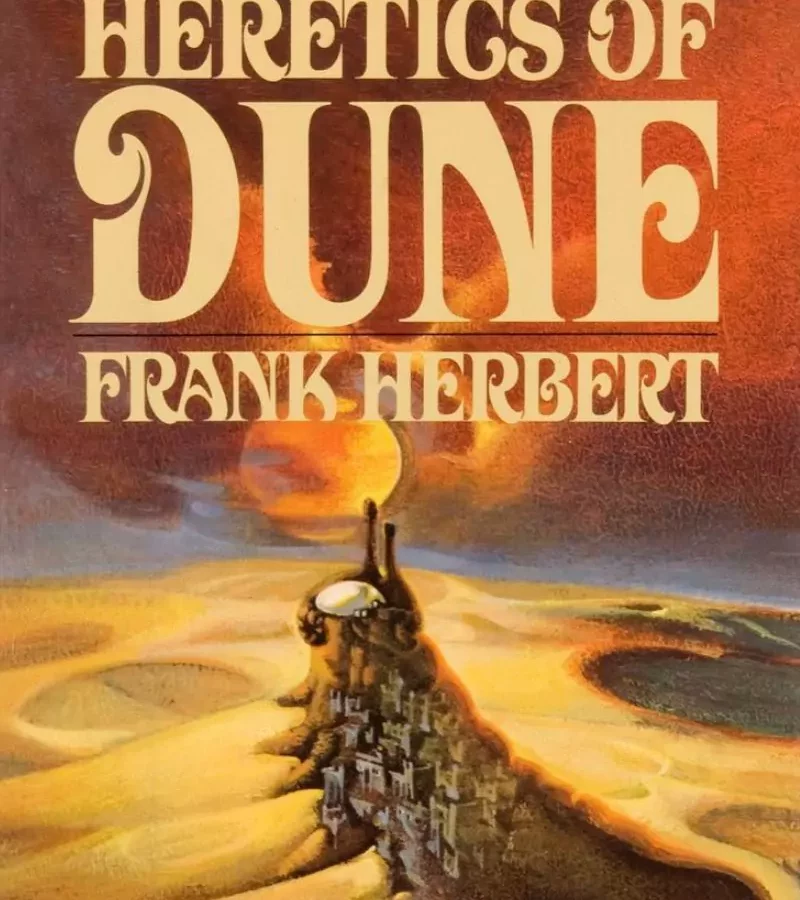
In the realm of science fiction literature, Frank Herbert’s iconic Dune series has captivated readers with its richly detailed world-building and thought-provoking themes.
As fans eagerly anticipate the upcoming film adaptations and contemplate the future of the franchise, this article presents the ultimate ranking of every Dune book.
From the groundbreaking original novel to the influential later installments, each book offers a unique contribution to the vast tapestry of the Dune universe.
Delve into this comprehensive ranking to gain valuable insights into the enduring legacy of Dune.
Dune (1965)
Introducing the foundation of the series, ‘Dune’ (1965) explores the conflict over the melange spice, captivating readers with its iconic lines, scenes, characters, and world-building. As the ultimate foundation for the series, ‘Dune’ stands on its own as a highly acclaimed and influential novel.
The story revolves around the battle for control over the valuable melange spice, which grants heightened awareness and longevity to those who consume it. This conflict sets the stage for a captivating narrative that delves into themes of power, politics, and religion.
One of the most memorable aspects of ‘Dune’ is the inclusion of iconic lines such as the famous Litany Against Fear, which has become a hallmark of the series. The novel is bursting with vivid scenes that transport readers to the desert planet of Arrakis, where giant sandworms and vast expanses of shifting sands dominate the landscape.
Moreover, ‘Dune’ introduces a rich cast of characters, each with their own motivations and complexities. From the young protagonist Paul Atreides, who undergoes a transformative journey, to the enigmatic and powerful beings known as the Bene Gesserit, the characters in ‘Dune’ leave a lasting impression on readers.
Additionally, the world-building in ‘Dune’ is unparalleled. The novel immerses readers in a meticulously crafted universe, complete with intricate political systems, religious factions, and ecological dynamics. Frank Herbert’s attention to detail and his ability to create a fully realized world captivates readers and sets the stage for the epic series that follows.
Children of Dune (1976)
Children of Dune (1976) continues the epic series, delving deeper into the story of Paul Atreides’ children and their pivotal roles in the battle for control over the melange spice. The novel focuses on Leto II and Ghanima, the twins born to Paul and his Fremen concubine, Chani. It reveals more about the sandworms and the addictive substance that is the lifeblood of the empire, melange.
Children of Dune builds upon the foundation laid in the previous books, further expanding the rich universe of Dune. It also marks the beginning of Leto’s fascinating character arc, as he inherits his father’s prescience and faces the difficult choices that lie ahead.
While Children of Dune has been met with some divisive opinions, it has grown in influence upon reflection. Frank Herbert’s intricate storytelling and exploration of complex themes continue to captivate readers. The novel delves into the intricate power struggles and political machinations that shape the destiny of Arrakis and its inhabitants. With its thought-provoking narrative and memorable characters, Children of Dune remains an essential installment in the Dune series.

God Emperor of Dune (1981)
What makes God Emperor of Dune (1981) a unique addition to the Dune series?
God Emperor of Dune stands out as a distinct and thought-provoking installment in the Dune series. It is the most philosophy-centric book in the series, with Leto II serving as the mouthpiece for philosophical musings. The book explores deep existential questions and delves into the nature of power, control, and sacrifice.
Duncan Idaho, a recurring character in the series, plays a prominent role in this book, bringing an element of familiarity amidst the philosophical discourse. Moreover, God Emperor of Dune serves as the climax of the previous three books, bringing together various storylines and resolving key conflicts.
However, the book is also divisive due to Leto’s frequent pontificating, which some readers may find excessive. Despite this, God Emperor of Dune offers a unique reading experience that pushes the boundaries of science fiction and challenges readers to ponder the complexities of human existence.
Heretics of Dune (1984)
Continuing the exploration of the Dune series, the next installment, Heretics of Dune (1984), takes readers 1500 years into the future, presenting a captivating narrative that builds upon the foundation laid by God Emperor of Dune.
In this novel, author Frank Herbert reintroduces the sandworms, a beloved element of the earlier books, and introduces new characters and changes in planet names.
While the previous books in the series focused primarily on the Atreides family and their struggles, Heretics of Dune shifts its focus towards the Bene Gesserit, a powerful and secretive sisterhood. This shift in perspective adds new layers of intrigue and complexity to the story.
Unlike its predecessor, Heretics of Dune is more action-packed, keeping readers on the edge of their seats with its fast-paced plot.
With its exploration of power dynamics, political maneuverings, and philosophical themes, Heretics of Dune further expands the rich and immersive universe created by Frank Herbert.
It is a worthy addition to the Dune series and will leave readers eager to delve deeper into this captivating science fiction saga.

Chapterhouse: Dune (1985)
In Chapterhouse: Dune (1985), the narrative of the Dune series transitions to a different planet while delving deeper into the power games played by the Bene Gesserit order. Set on the planet Rakis, the story continues from the viewpoint of the Bene Gesserit, a powerful and secretive sisterhood.
The main characters and the main planet from previous books are gone, giving way to a new setting and new challenges. Chapterhouse: Dune is often considered the worst book in the series, but it serves as a great epilogue to the epic saga.
The focus on the Bene Gesserit allows for a closer examination of their intricate manipulations and political maneuverings. While the book may lack the iconic elements and world-building of the earlier installments, it offers a compelling exploration of power dynamics and the consequences of the Bene Gesserit’s actions.
Despite its reputation, Chapterhouse: Dune remains an important part of the Dune series, providing a thought-provoking conclusion to the narrative.
Dune Film Adaptations
Chapterhouse: Dune (1985) concludes the epic saga of the Dune series, and now it is time to delve into the realm of Dune film adaptations.
The most recent adaptation is the 2021 film directed by Denis Villeneuve, which covers only the first half of the book. Due to time constraints, the director had to cut several scenes, leaving fans eagerly anticipating the release of Dune: Part 2 on November 3, 2023. The second part will reveal the events that followed the fall of House Atreides in Arrakis and arrive at the explosive conclusion of the first book.
If Dune 2 is successful, it may pave the way for a full-feature adaptation of Dune Messiah in Dune 3. Villeneuve initially envisions Dune 3 as the ending of his remake.
These adaptations contribute to the evolution of the sci-fi genre, bringing the world of Arrakis to mainstream audiences and introducing new viewers to the rich universe created by Frank Herbert.
As the legacy of Dune continues, reading the original Dune books still offers a unique and highly regarded experience.

Potential Future Adaptations
The potential for future adaptations of the Dune series opens up exciting possibilities for expanding the cinematic universe created by Denis Villeneuve’s recent film adaptation. With Dune: Part 2 already slated for release in 2023, there is a clear path for continuing the story and exploring the events that follow the fall of House Atreides in Arrakis. If Dune 2 proves to be successful, it may pave the way for a full-feature adaptation of Dune Messiah in Dune 3, as envisioned by Villeneuve.
The legacy of Frank Herbert’s Dune continues to captivate audiences, and the original books are still highly regarded and treasured. The potential for future adaptations not only introduces new viewers to the rich universe created by Herbert, but also provides an opportunity for fans of the original novels to see their beloved characters and stories come to life on the screen.
Furthermore, these adaptations contribute to the evolution of the science fiction genre. Dune brings the world of Arrakis to mainstream audiences, showcasing the intricate world-building, political intrigue, and philosophical themes that have made the series a classic. As sci-fi continues to evolve, the potential for future adaptations of Dune ensures that Frank Herbert’s legacy will live on, inspiring new generations of fans and pushing the boundaries of the genre.
Frequently Asked Questions
How Does the Director of the Dune Film Adaptation Plan to Handle the Events That Follow the Fall of House Atreides in Arrakis?
The director of the Dune film adaptation plans to handle the events that follow the fall of House Atreides in Arrakis in Dune 2, the upcoming sequel. It will reveal the aftermath and conclude the storyline of the first book.
What Are Some of the Changes in Planet Names Introduced in the Book Heretics of Dune?
In the book “Heretics of Dune,” there are changes in planet names. These changes occur 1500 years after “God Emperor of Dune” and introduce new characters. The focus also shifts towards the Bene Gesserit.
Why Is Chapterhouse: Dune Considered the Worst Dune Book, Despite Being a Great Epilogue?
Chapterhouse: Dune is considered the worst Dune book due to the absence of main characters and the main planet. However, it is praised for its role as a great epilogue, tying up loose ends and providing closure to the series.
What Is the Significance of Leto II Serving as the Mouthpiece for Philosophy in God Emperor of Dune?
In God Emperor of Dune, Leto II serves as the mouthpiece for philosophy, embodying the profound ideas and concepts explored in the book. His role adds depth and intellectual discourse to the narrative, making it a significant aspect of the story.
How Do the Dune Adaptations Contribute to the Evolution of the Science Fiction Genre?
The Dune adaptations contribute to the evolution of the science fiction genre by bringing the rich universe of Arrakis to mainstream audiences. These adaptations introduce new viewers to Frank Herbert’s legacy and expand the boundaries of the genre.

Conclusion
In conclusion, the Dune series by Frank Herbert has left an indelible mark on science fiction literature. Each book in the series offers a unique perspective on the complex world of Arrakis and explores thought-provoking themes.
From the groundbreaking original novel to the later installments, the Dune series continues to captivate readers with its richly detailed world-building and complex characters. With upcoming film adaptations and potential future adaptations, the enduring legacy of Dune is sure to endure for years to come.





